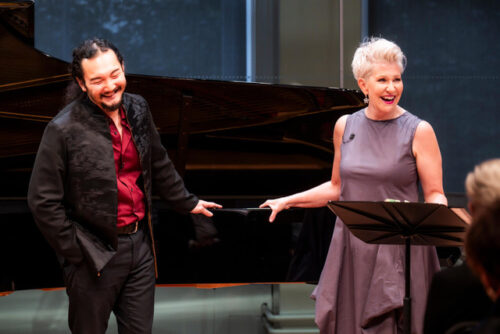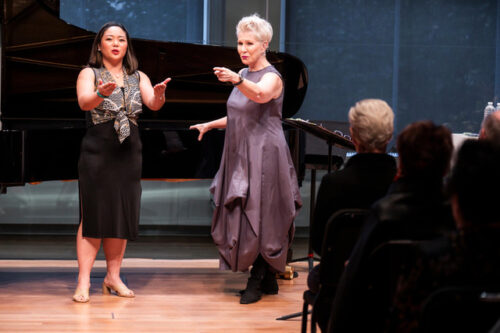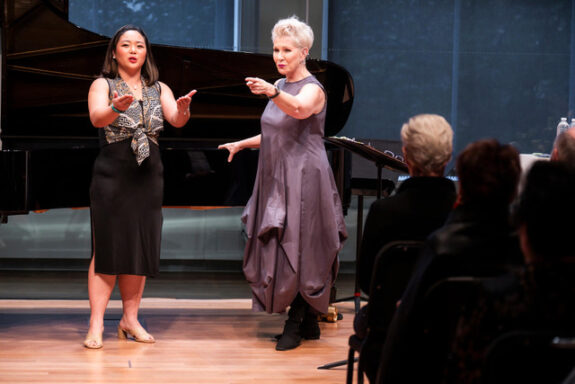 United States ‘Joyce DiDonato Master Classes’: Joyce DiDonato with Bridget Esler (soprano), Michelle Mariposa (mezzo-soprano), Ben Reisinger (tenor), Robert Ellsworth Feng (bass), Joel Harder & Justina Lee (piano). Carnegie Hall’s Resnick Education Wing, New York, 11-12.10.2024. (RP)
United States ‘Joyce DiDonato Master Classes’: Joyce DiDonato with Bridget Esler (soprano), Michelle Mariposa (mezzo-soprano), Ben Reisinger (tenor), Robert Ellsworth Feng (bass), Joel Harder & Justina Lee (piano). Carnegie Hall’s Resnick Education Wing, New York, 11-12.10.2024. (RP)

After the prolonged round of applause that followed Ben Reisinger’s full-throated ‘Una furtiva lagrima’ from Donizetti’s L’elisir d’amore, Joyce DiDonato peppered him with questions. The young tenor responded with a series of ‘Yups’, prompting DiDonato to ask him why he wanted to sing opera. Reisinger responded softly – ‘the music’. That was good enough for DiDonato.
During the two public sessions of the three-day master class experience, DiDonato repeatedly advised that the four singers were to be accepted for where they are at this stage of their development. The same held true, she added, for the industry professionals who had heard the young singers in a nonpublic session. Everyone is gauging you as you are now, not as what you aspire to be, DiDonato told the singers.
Reisinger is perhaps more of a work in progress than the other three singers, soprano Bridget Esler, mezzo-soprano Michelle Mariposa and bass Robert Ellsworth Feng. The aspiring tenor, who is in the Metropolitan Opera’s Lindemann Young Artist Development Program, has just recently switched from singing baritone. So much is new for him, from the range in which he is now singing to the roles he performs. Tenors usually are the lovers who get the girl, while baritones tend to be sly and clever tricksters or villains.
At the core of DiDonato’s approach to working with young singers is the stripping away of anything that gets in the way of vocal production. For Reisinger, that entailed taking off his jacket and singing with his back to the audience with his head deep inside the piano. The goal was for the tenor to connect with the music and let go of the extraneous stuff. It worked, with Reisinger singing the Donizetti aria with a sincerity and beauty of tone that revealed completely different aspects of his voice and his artistry than he had previously displayed.

Michelle Mariposa, a young artist with the Washington National Opera, possesses an exceptionally fine mezzo-soprano voice and comes equipped with keen dramatic instincts. She sang an overpowering ‘Give him this orchid’, Lucretia’s aria from The Rape of Lucretia by Benjamin Britten. It is an aria that DiDonato had not sung. Her most cogent advice to Mariposa was to leave room for the audience to think about and absorb the horrors that the woman has experienced.
The next aria that Mariposa sang was ‘Werther! Qui m’aurait dit . . . Ces lettres!’ (‘Letter Scene’) from Massenet’s Werther. Charlotte is a role that DiDonato has sung, and she offered advice on phrasing, dynamics and character. But as she did with Reisinger, she cut to the quick in advising the younger mezzo-soprano to jettison whatever external pressures you put on yourself to succeed. Just sing the aria, which in Mariposa’s case is reward enough for anyone.
Establishing a connection with the character whom she was portraying was at the heart of DiDonato’s work with Bridget Esler, a young artist with L’Atelier lyrique de l’Opéra de Montréal. The soprano first sang ‘Prendi per me sei libero’, which comes at the end of Donizetti’s L’elisir d’amore when the sixteen-year-old Adina finally admits to Nemorino that she loves him. With Elser’s free and easy top range and her superb coloratura, there was little in the way of vocal advice for DiDonato to offer to the young soprano. She could, however, urge Elser to convey the wonder of the moment – Nemorino enabled Adina to be honest simply because he was.
Elser also brought a Handel aria to sing, ‘Ingrato Polinesso . . . Neghittosi or voiche fate?’ from Ariodante. DiDonato is acclaimed for her Handel roles, and she has triumphed as Ariodante. At this moment in the opera, Darinda, a servant who has been betrayed by a nobleman, is emotionally unleashed and so angry that she cannot even think. Handel captured Darinda’s youth and explosiveness in the runs in the aria that he gave her to sing. DiDonato urged Elser to toss off those runs with an almost brutal forward momentum, never withdrawing or shrinking away from Darinda’s fury. For singer and observers alike, it was an amazing opportunity to gain insight in what makes a baroque da capo aria come alive.
Robert Ellsworth Feng has a string of awards and competition wins. The bass has an active career as a singer, but he is also a librettist. His arias were ‘Je t’implore’, sung by King Claudius in Thomas’s Hamlet, and ‘You know my heart’ from Nick Bentz’s Having Guests for Dinner, for which Feng wrote the libretto. DiDonato probed Feng on his taste for the obscure. The questions were grounded in the simple truth that the choice of repertoire is not in a young singer’s control at the beginning of a career.
DiDonato’s advice to Feng, as with the other three singers, was basically to keep it simple, both vocally and dramatically. In the aria from Having Guests for Dinner, she counseled him to focus on the humanity of a man who just happens to be a cannibal. When he leaned into the bel canto aspects of Bentz’s writing for the voice, as DiDonato advised, he made a deeper human connection, verging on compassion, with the character he was portraying, which the audience grasped immediately.
Master classes such as this provide incredible experience for young singers: a chance to hone their artistry, and for global exposure and insights into the reality of pursuing a career in opera. Talent is not enough, and DiDonato makes that clear. The sessions are just as valuable, however, for the people who attend or watch them on video. Delving so deeply into the craft of being a singer with Joyce DiDonato reverberates with you every time you listen to a musician anywhere, anytime.
Rick Perdian
Joyce DiDonato Master Classes are available for free replay for one year on YouTube (here) and medici.tv (here).
